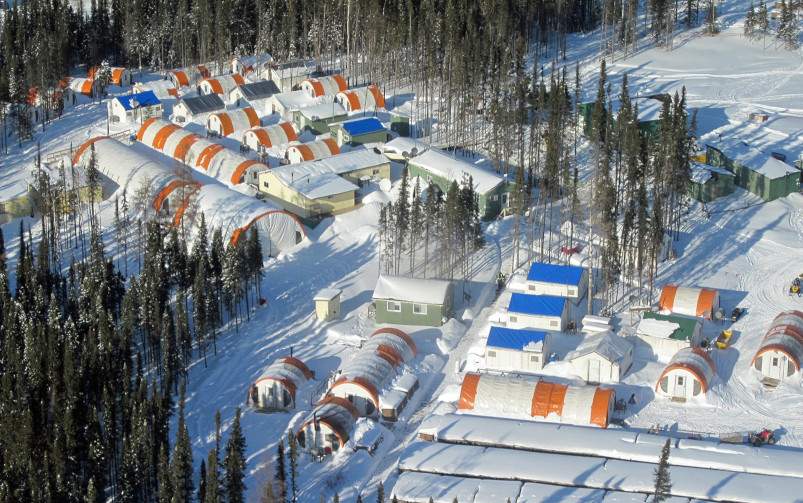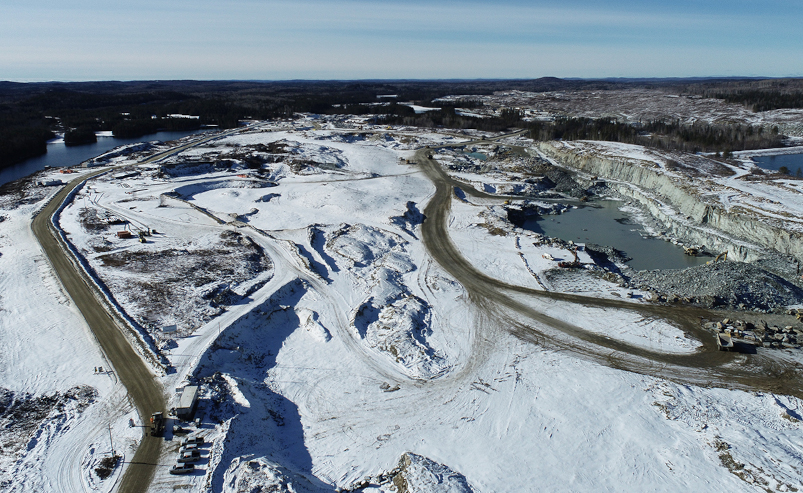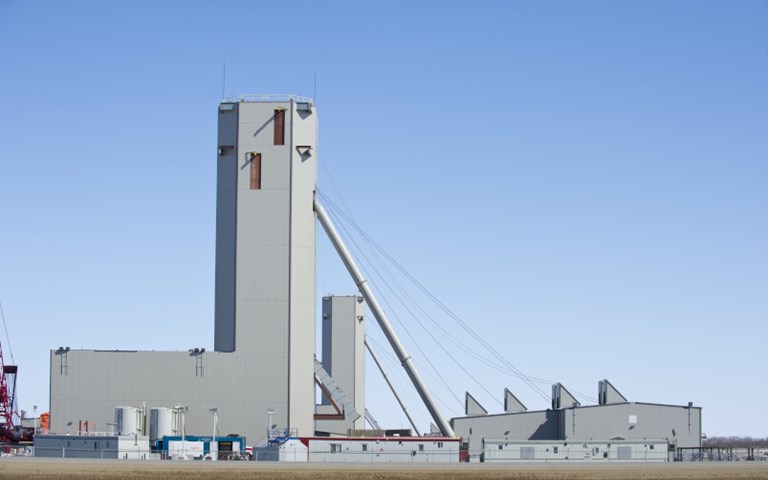BHP promised to make a decision on whether to approve its planned Jansen potash mine in Saskatchewan by mid-2021. Courtesy of BHP.
Welcome back to your weekly mining news recap, where we catch you up on some of the news you may have missed. This week’s headlines include surging copper prices, clean technology to recycle old mining tires and our 2021 CIM Award winners.
Award winners were announced yesterday at The CIM-Caterpillar Celebration of Excellence. The awards recognize individuals and companies that drive the industry forward and put focus on safety, sustainability, and environmental, social and corporate governance, as well as diversity and inclusion. National winners for the John T. Ryan safety awards include Westmoreland Coal, Poplar River Mine (Coal); Glencore Nickel Mine Raglan (Metal); Mine Matagami and Vale Newfoundland & Labrador, Voisey’s Bay Mine (Select). CIM extends its congratulations to all the winners.
Copper stocks are seeing a major lift in advance of an anticipated post-pandemic boom, in which commodities and their role in global construction and manufacturing will play a major role, as reported by The Globe and Mail. On Tuesday, the price of copper on the London Metal Exchange hit US$9,965 a tonne, which is close to surpassing its record high set in 2011. Experts believe that increasing demand combined with supply constraints resulting from frequent COVID-19 shutdowns have played a large part in the price increase.
The Alberta oil sands are in the grips of a COVID surge, with 12 oil sands production sites reporting outbreaks, as reported by The Financial Post. According to Alberta Health Data, over 2,000 COVID-19 cases have been linked to the facilities, with 752 considered active and two deaths linked to the facilities. More than 1.5 per cent of Fort McMurray’s population is currently infected with the novel coronavirus, the highest rate in Alberta, government data shows.
The United States’ Environmental Protection Agency is saying that the Army Corps of Engineers violated federal policy in removing the Clean Water Act permitting authority for Hudbay Minerals’ proposed Rosemont copper mine in Arizona, as reported by Tucson.com. According to the Corps, new federal rules no longer required Hudbay to get a permit, and that it engaged in “informal coordination” with the agency. Hudbay recently had its federal approval from the U.S. Forest Service for the mine revoked, a decision which is now under appeal.
Following feedback from thousands of Albertans, the provincial government has halted all coal exploration projects on Category 2 lands, covering the eastern slopes of the Rocky Mountains, as reported by Mining.com. This follows the backlash the government received following its decision to rescind a policy governing exploration in the area, which was later reinstated. The decision to halt exploration will impact six projects currently in the exploration stage. Concurrently, five First Nations, whose lands lie in the foothills of Alberta's Rocky Mountains, and three coal companies – Cabin Ridge, Montem Resources and Benga Mining – have demanded better Indigenous consultation from the province, as reported by CTV News.
Never miss another recap
Sign up for the latest news from CIM Magazine and the Canadian Institute of Mining, Metallurgy and Petroleum.
The Canadian government is supporting efforts to build a competitive green economy in Canada by investing $1.9 million towards the development of a cleantech innovation hub at the University of British Columbia’s Okanagan campus (UBCO). The clean technologies developed by the hub will be focused on sustainable ways to derive carbon-based materials from the mining, oil and gas industries. Since October 2016, UBCO has had a partnership with B.C.-based commercial and mining tire retailer Kal Tire. Together, they are developing research on how to recycle end-of-life mining tires into reusable, high-quality carbon products as part of a circular economy.
Ivanhoe Mines reported on April 26 that the Kamoa-Kakula copper project in the Democratic Republic of the Congo would receive a boost to its renewable power supply thanks to a planned upgrade to Turbine 5 at the Inga II hydropower complex. Ivanhoe Mines Energy DRC signed a memorandum of understanding with the DRC’s state-owned power company La Société Nationale d'Electricité (SNEL) to upgrade the turbine. The planned upgrade to the turbine will raise its output by an estimated 162 megawatts, part of which will go towards powering the project, with any excess added to the national power grid.
Environmental and social responsibility is becoming a key influence on consumer decision-making. In a 2020 study, Accenture Strategy found that in a post-COVID-19 world, 43 per cent of American consumers “would walk away when disappointed by a brand’s words or actions on social issues.” Companies like the Ford Motor Company are looking for assurance that the mined materials that enter their products meet standards that demonstrate their social and environmental responsibility. Companies have made responsible sourcing a focus by applying standards for sustainable development to their upstream and downstream supply chains.
A Scotiabank analyst has reported that he is 90 per cent confident that BHP’s planned Jansen potash mine in Saskatchewan will be approved within the next few months, as reported by CBC. Originally announced in 2010, Jansen was once hailed as the largest potash project in the world, but low potash prices meant the company never gave the mine final approval. In a year-end call, BHP promised its shareholders that it will go to its board to make a final decision on the project sometime in the middle of 2021.
Companies are releasing their first quarter results, and we’ve rounded up some of the highlights.
Newmont reported 1.5 million attributable ounces of gold produced and 317 thousand attributable gold equivalent ounces produced from co-products, with an all-in sustaining cost of US$1,039 per ounce.
Champion Iron reported 2,011,400 wet metric tonnes of high-grade iron-ore concentrate produced, with a production cost of $54.4 per dry metric tonne.
Sherritt reported production of 4,188 tonnes of nickel and 477 tonnes of cobalt, at a unit operating cost of US$3.83 per pound of nickel.
Teck produced 72,000 tonnes of copper, 146,000 tonnes of zinc, 5.9 million tonnes of steelmaking coal. Its EBITDA for the quarter is $967 million, up from $608 million in Q1 2020.
Yamana reported 231,988 ounces of gold produced in the first quarter, with an all-in sustaining cost of US$1,045.
Agnico Eagle reported production of 504,545 ounces of gold, and an all-in sustaining cost of US$966.
Eldorado Gold produced 111,742 ounces of gold in Q1, with an all-in sustaining cost of US$986.
That’s all for this week! We hope to see you at our upcoming CIMVTL21 Convention starting on May 3! If you’ve got feedback, you can always reach us at editor@cim.org. If you’ve got something to add, why not join the conversation at our Facebook, Twitter or LinkedIn pages? Like your recap with a few more gifs? Check out our mining news recap stories on our Instagram.
Remember to stay safe, keep your distance and wash your hands!




